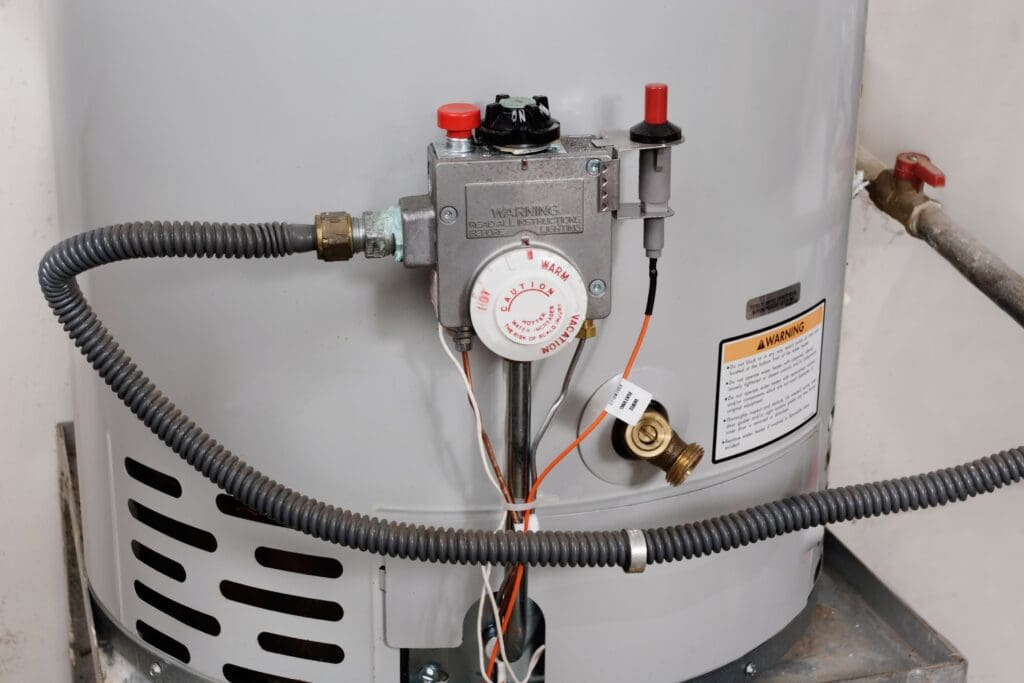
A water heater leaking in your home can be a cause for concern, and you may find yourself wondering whether it’s time for a replacement. While a leaking water heater is undoubtedly an issue that demands attention, the severity of the leak, the age of the water heater, and the specific cause of the leak are all factors that influence the decision to repair or replace. In this blog post, we’ll delve into the common reasons for water heater leaks, potential repair options, and considerations for determining whether it’s time to invest in a new unit.
Common Causes of Water Heater Leaks
Pressure Relief Valve
The pressure relief valve is a crucial safety feature in water heaters, designed to release excess pressure to prevent the tank from exploding. If the valve is faulty or there is an issue with the pressure in the tank, it can cause the valve to leak.
Leaking Drain Valve
The drain valve is located near the bottom of the water heater and is used for flushing sediment from the tank. Over time, these valves can become loose or develop leaks, leading to water escaping from the tank.
Corrosion
Corrosion is a common cause of water heater leaks, especially in older units. Over time, the tank can corrode, resulting in small or large leaks. Corrosion is often accelerated in areas with hard water or when the sacrificial anode rod, designed to protect the tank from corrosion, is depleted.
Rusty Tank
A water heater tank is typically made of steel, and when rust begins to develop on the tank’s interior, it can eventually lead to leaks. This is a sign of significant corrosion and is often an indication that the water heater is reaching the end of its lifespan.
Loose or Damaged Inlet or Outlet Connections
The connections where water enters and exits the water heater can develop leaks if they become loose or damaged. This can happen due to natural wear and tear or if there’s excessive pressure in the system.
Repairing a Leaking Water Heater
The decision to repair a leaking water heater depends on the severity of the leak and the underlying cause. Here are potential repair options for common water heater issues:
Leaking Drain Valve
A water heater’s Drain Valve may leak due to sediment accumulation, causing corrosion and compromising the valve’s seal. Age, wear, and damage can also lead to degradation and leaks. Inadequate installation or improper closure post-maintenance may contribute to the issue. Regular sediment flushing, careful maintenance, and ensuring a proper seal are crucial for prevention. If leaks persist, consulting a professional plumber for assessment and potential valve replacement is recommended.
Corrosion
Corrosion is a common cause of leaks in water heaters. Over time, the metal components of the heater, particularly the tank, can corrode due to the reaction with water and other elements. Corrosion weakens the structural integrity of the tank, creating vulnerabilities that may lead to leaks. The corrosive process is often accelerated in areas with hard water, high mineral content, or if the water heater lacks proper anode rod maintenance.
Loose or Damaged Connections
Loose or damaged connections can be a source of leaks in water heaters. The various components of a water heater, such as pipes, valves, and fittings, rely on secure connections to maintain a watertight system. If these connections become loose or damaged over time, water can escape, leading to leaks. Vibrations, thermal expansion and contraction, or external factors can contribute to the loosening or deterioration of connections.
When to Consider Water Heater Replacement
While repairs may be suitable for certain issues, there are instances where water heater replacement becomes the more practical and cost-effective solution:
Age of the Water Heater
Considering the age of a water heater is crucial when deciding whether to replace it. Over time, water heaters experience wear and tear, leading to a decline in efficiency and an increased risk of malfunctions. As heaters age, sediment buildup, corrosion, and degradation of components become more prevalent, impacting performance and potentially causing leaks. Older models may lack the energy efficiency of newer ones, resulting in higher utility bills. Additionally, advances in technology lead to more energy-efficient and environmentally friendly water heaters. Therefore, evaluating the age of a water heater is essential in making informed decisions about replacement, ensuring optimal performance, safety, and cost-effectiveness in the long run.
Frequency of Repairs
The frequency of water heater repairs is a crucial factor to consider when contemplating replacement. A high frequency of repairs may indicate that the water heater is reaching the end of its service life or experiencing significant issues. Continuous repairs not only incur costs but also suggest diminishing reliability and efficiency. Investing in a new water heater becomes more cost-effective and practical when repair costs accumulate. Frequent breakdowns can lead to inconvenience and potential water damage. By evaluating the repair history, homeowners can make informed decisions about replacing their water heaters, ensuring a more reliable and efficient hot water supply in the long term.
Inefficiency
The inefficiency of a water heater is a crucial factor in deciding whether to replace it. Over time, older models become less energy-efficient, resulting in higher utility bills. Upgrading to a more efficient water heater not only reduces costs but also aligns with environmental sustainability. By assessing efficiency, homeowners can make informed choices about replacement, benefiting from modern technologies and contributing to long-term cost savings and reduced environmental impact.
Safety Concerns
Safety concerns are paramount when deciding whether to replace a water heater. Over time, aging water heaters may develop issues such as corrosion, leaks, or faulty pressure relief valves, posing potential hazards. Sediment buildup can contribute to overheating and increase the risk of scalding accidents. In extreme cases, a malfunctioning water heater may even pose a risk of fire or explosion. By prioritizing safety considerations, homeowners can ensure the well-being of their households. Upgrading to a newer, safer water heater model with enhanced safety features provides peace of mind, minimizing the risk of accidents and ensuring a secure hot water supply for the home.
Colorado Water Heater Repair and Replacement: Expert Solutions for Efficient Systems
A leaking water heater is a situation that requires prompt attention, and the decision to repair or replace depends on various factors. If the leak is minor and repairable, addressing the specific issue may extend the water heater’s lifespan. However, if the water heater is aging, corroded, or experiencing frequent issues, replacement may be the more prudent choice.
It’s essential to consult with a professional plumber to assess the severity of the leak and provide expert guidance on the most appropriate course of action. Investing in a reliable and energy-efficient water heater not only ensures a steady supply of hot water but also contributes to the overall efficiency and safety of your home’s water heating system.



